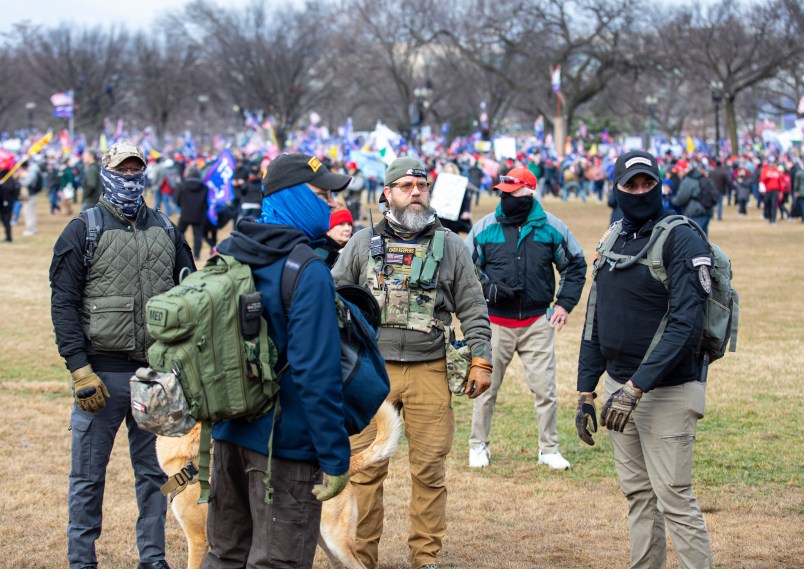On Tuesday an Alabama man became the second Capitol attack defendant to plead guilty to participating in an Oath Keepers conspiracy to interrupt Congress on Jan. 6.
Mark Grods brought firearms to Washington, D.C. in early January but gave them to another individual to store at a Virginia hotel, according to the criminal information that formed the basis of his guilty plea. And on the day of the attack, he rode in a golf cart with others to the scene of the attack. He was also part of the “stack” of Oath Keepers that moved in formation toward the door of the Capitol, according to the information, and he entered the Capitol “with a large stick.”
A couple days after the attack, Grods got the order to “make sure that all signal comms about the op has been deleted and burned,” which Grods subsequently confirmed that he had done, earning him his second charge for deleting Signal chat evidence.
But Grods wasn’t like most defendants in the large conspiracy case, which involves more than a dozen defendants including one who’s already pleaded guilty. Rather than being identified and charged as part of that case, Grods was charged individually, and the allegations against him were filed under seal on Monday, more than five months after the attack.
“The government’s filing of a criminal Information for defendant, Mark Grods, is part of an ongoing grand jury investigation and plea negotiation related to United States v. Thomas Caldwell,” prosecutors said in a request Monday to keep Grod’s case under seal. The file was ultimately made public Wednesday a few hours before Grod pleaded guilty to two counts, conspiracy and obstruction of an official proceeding.
“Disclosure of these documents and this docket would endanger other aspects of the government’s ongoing investigation, including the destruction of evidence and the safety of potential witnesses, to include the defendant,” prosecutors added.
Prosecutors may have had access to Grods’ communications for months: In an April 9 filing in the case of an alleged Oath Keeper conspirator, Joshua James, prosecutors quoted a Signal conversation James allegedly had with an unnamed “individual who, based on the government’s investigation to date, was in Washington, D.C. on January 6 and stormed the Capitol.”
“So, I guess I am taking full gear less weapons? Just reading through all the posts. Would rather have it and not need it,” the “individual” was quoted as saying on Jan. 2.
“Yeah full gear… QRF will have weapons Just leave em home,” James responded, referring to the “quick reaction force” that prosecutors have said amounted to a room full of guns and men in a Virginia hotel.
It’s not clear whether this was the same hotel room in which Grods’ weapons were stored, but the criminal information filed Monday in Grods’ case did identify him as the source of the quote from the “individual” in the James filing. James also appears to be the individual who allegedly instructed Grods to delete his Signal messages.
U.S. District Judge Amit Mehta on Wednesday did not stray far from the script that accompanies most plea hearings. He confirmed with Grods that the defendant had agreed to cooperate with the government, including by testifying before a grand jury and sitting for interviews with law enforcement.
Mehta noted that the offense level, used to help determine sentencing, was elevated in Grods’ case because it involved substantial interference with the administration of justice, was extensive in scope, planning or preparation, and because Grods had deleted his Signal messages. The sentencing guidelines decreased slightly because the government has agreed that Grods played a “minor role” and because he accepted responsibility, Mehta said.
The judge set a 60-day deadline for the parties to follow up with a joint status report. He allowed Grods to await that hearing out of detention — on several conditions, including that he not communicate with anyone associated with the Oath Keepers or defendants in the Oath Keepers conspiracy case.







The “second” one to plead here refers to this one being the second to plead guilty to conspiracy. The feds are making damned sure there’s every bit of encouragement for future juries to convict on the big C charge.
Wow. Sixty days without talking to anyone? Seems a bit harsh, even cruel and unusual.
Also, I’ll bet fifty bucks he violates the terms, and I doubt Judge Mehta would take that bet.
Hope they were able to refill his job at the local Waffle House. It’s a tight labor market, and those plates aren’t gonna wash themselves.
I want to know why in every video I’ve seen of these traitorous monsters there are numerous cretins with the same red-white bullhorns. Who distributed them and who were the recipients and subsequent bullhorn blowhards.
Anyway, this video is enraging even though we’ve seen most of it before.